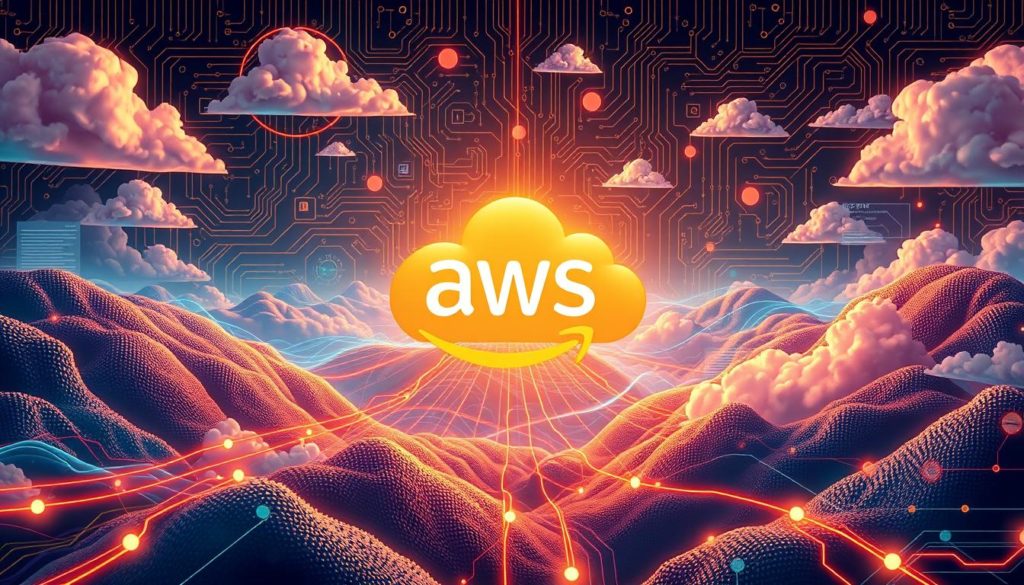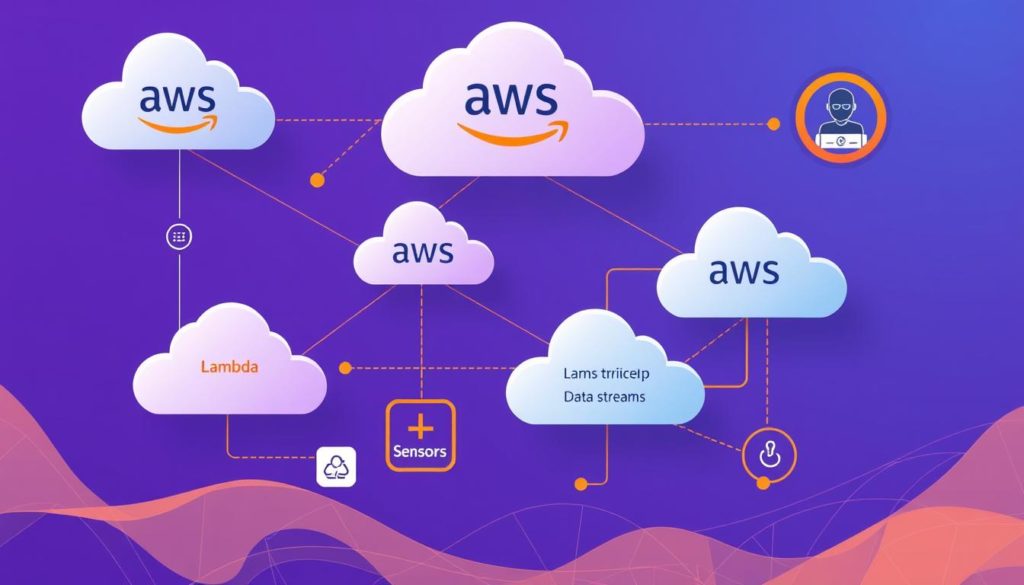
Did you know 60% of companies in the US use serverless computing to make their cloud work easier and cheaper? This big change in cloud computing is thanks to AWS Lambda.
So, what is AWS Lambda and why is it so big news? AWS Lambda is a service by Amazon Web Services that lets developers write code without worrying about servers. It turns your code into AWS Lambda functions that run when needed, thanks to specific triggers.
The magic of AWS Lambda, a key part of serverless computing, is it scales automatically as needed. This makes it a smart choice for building apps today. By letting AWS handle tasks like managing servers, scaling, and logging, you can focus on what’s important in your development work.
Also, AWS Lambda is super flexible, offering things like environment variables and container images to help build apps that grow and stay safe. To learn more about how AWS Lambda functions can make your cloud work easier, keep reading our full guide.
Key Takeaways
- AWS Lambda lets developers run code without managing servers.
- It organizes code into functions that execute in response to triggers.
- Being a centerpiece of serverless computing, it scales automatically based on demand.
- AWS Lambda manages infrastructure, deployment, and scaling, simplifying cloud operations.
- Advanced features include environment variables, container images, and more.
Introduction to AWS Lambda
AWS Lambda is a key part of Amazon Web Services. It offers a strong platform for running functions without the need to manage servers. This serverless approach lets developers focus on writing code. AWS Lambda takes care of the server setup.
What is AWS Lambda?
AWS Lambda is a serverless computing service. It runs code when triggered by AWS services or outside sources. This makes it flexible and efficient. Each function runs in its own space, ensuring it scales and stays secure.
How AWS Lambda Works
AWS Lambda works smoothly and efficiently. When a function is triggered, it takes care of all the setup. The architecture of AWS Lambda means it scales automatically. You only pay for the time and memory used, which helps keep costs down.
Supported Languages and Runtimes
AWS Lambda supports many programming languages. This makes it useful for developers all over the world. You can write functions in Node.js, Python, Ruby, Java, Go, C#, and PowerShell Core. This wide support is a big plus for many users.
Exploring AWS Lambda shows how it can change the way we do serverless computing. It makes our work more efficient and streamlined.
AWS Lambda Architecture
AWS Lambda is all about providing a serverless computing environment that’s fully managed. This means we can build applications without worrying about the servers. AWS takes care of hosting, scaling, and running our code. This lets us focus more on creating new things and less on the technical stuff.
The Concept of Serverless Computing
Serverless computing is all about speed and ease. It means we don’t have to deal with server management. This fits perfectly with AWS Lambda, where our code runs as separate units that start when needed.
Event-Driven Architecture
Event-driven architecture is key to AWS Lambda. It lets our apps respond to different events like web requests, database changes, or file uploads. This makes AWS Lambda crucial for building systems that can handle lots of activity smoothly.
Function Containers and Allocation
AWS Lambda manages resources through function containers. Each function runs in its own container, managed by AWS. This way, resources are used efficiently, scaling up or down as needed. It helps keep costs down and performance up.
| Feature | AWS Lambda | Traditional Servers |
|---|---|---|
| Scalability | Automatic scaling up/down | Manual provisioning |
| Cost Management | Pay-per-invocation | Continuous resource allocation |
| Maintenance | Fully managed | User managed |
AWS Lambda vs EC2: Key Differences
When looking at AWS Lambda vs EC2, it’s key to see what makes them different. Each has its own benefits for certain tasks and cloud setups.
Server Management
One big difference is how they handle server management. With Amazon EC2, you manage servers yourself. This gives you full control over settings and the environment. On the other hand, AWS Lambda takes care of servers for you. This means you don’t have to worry about setting up or managing servers. You can focus more on writing code and solving business problems.
Cost Efficiency
Cost Efficiency is a big deal when comparing AWS Lambda and EC2. EC2 charges you for running instances, even if they’re not fully used. AWS Lambda, however, only charges you for the time and power you actually use. This can save a lot of money, especially for tasks that don’t need constant running.
Scalability
Scalability is crucial when choosing between AWS Lambda and EC2. AWS Lambda automatically adjusts the number of instances based on how much it’s being used. This means it can handle more work without you having to do anything. EC2, on the other hand, needs you to manually or schedule scaling to keep up with demand. This can be more work and requires extra monitoring.
In short, knowing the details of AWS Lambda vs EC2 helps us make better choices for our cloud setups. By understanding what each service does best, we can use them together for the best cost efficiency and scalability in our applications.
Benefits of Using AWS Lambda
AWS Lambda is great for modern apps. One big plus is its pay-per-use model. This means costs match how much you use it, saving money on apps that don’t run all the time.
It also scales automatically, so it can handle more work without us having to do anything. This saves us time and lets us focus on creating new things. Plus, we don’t have to worry about servers, making our work easier.
Another big plus is how well it works with other AWS services. This makes building serverless apps easy and fast. It helps us bring new features out quicker, which is great for staying ahead.
| Feature | Benefits |
|---|---|
| Pay-per-use | Cost savings for sporadic workloads |
| Automatic Scaling | Handles varying demands without manual intervention |
| Fully Managed Infrastructure | Reduces operational effort, helps focus on coding |
| Integration with AWS Services | Facilitates building fully featured serverless applications |
In cloud computing, AWS Lambda is key for modern apps. It offers scalability and cost savings, making sure our IT infrastructure is reliable. Using AWS Lambda boosts our development work, making it faster and more creative.
Common AWS Lambda Use Cases
AWS Lambda is great for many tasks thanks to its event-driven and scalable nature. It helps us build strong and efficient solutions without worrying about the servers. This makes it easy to manage and maintain.
Scalable APIs
Building scalable APIs is a key use of AWS Lambda. By linking Lambda with API Gateway, each API route can be managed on its own. This ensures great performance even when loads change. It’s also cost-effective, as you don’t need extra server space.
Data Processing
AWS Lambda is also great for data processing. It can quickly respond to changes in data by working with other AWS services. This is super useful for handling data streams or doing real-time analytics. It makes data handling faster and more efficient.
Automating Business Tasks
Lambda is also key in automating business tasks. It can take care of tasks like data transfers, scheduled tasks, or processing forms. Automating these tasks cuts down on the need for server maintenance. This leads to lower costs and smoother operations for businesses.
Conclusion
AWS Lambda has shown how serverless computing can change the cloud world. It lets developers write code without worrying about servers. This means a more efficient workflow and lower costs thanks to a pay-for-what-you-use model.
Adding Lambda to our systems shows us the future of cloud innovation. We see how easy scalability and event-driven architecture work together. This is a big step forward.
AWS Lambda brings many benefits, like automated scaling and top-notch performance under any load. Companies like Netflix, T-Mobile, and MLB Advanced Media use Lambda and see great results. It’s a top pick for businesses looking to improve their cloud setup.
For those interested in serverless computing, AWS Lambda is a game-changer. It’s easy to use and supports many programming languages. This makes building and deploying apps easy.
FAQ
What is AWS Lambda?
AWS Lambda is a service from Amazon Web Services that lets developers run code without managing servers. It handles the infrastructure automatically.
How does AWS Lambda work?
Developers upload code to AWS Lambda, which runs when certain events happen. This service takes care of scaling, deployment, and logging. It removes the need for server management.
What languages and runtimes does AWS Lambda support?
AWS Lambda supports many programming languages and runtimes. These include Node.js, Python, Ruby, Java, Go, C#, and PowerShell Core.
What is the concept of serverless computing in AWS Lambda?
Serverless computing in AWS Lambda means AWS manages the infrastructure. Developers just write and deploy code. They don’t worry about servers, scaling, or maintenance.
How does an event-driven architecture benefit AWS Lambda?
An event-driven architecture lets AWS Lambda run functions based on specific events. This can be data changes, system events, or HTTP requests. It uses resources efficiently and saves costs by allocating them only when needed.
What are function containers in AWS Lambda?
Function containers are lightweight, isolated environments for running functions in AWS Lambda. AWS automatically provisions them and gives each function the resources it needs when triggered.
What are the key differences between AWS Lambda and Amazon EC2?
The main differences are in server management, cost, and scalability. AWS Lambda doesn’t need server management, has a pay-as-you-use pricing, and scales automatically. Amazon EC2 requires manual management and scaling, which can be costly for variable workloads.
How does AWS Lambda ensure cost efficiency?
AWS Lambda only charges for the compute time and memory used. This pay-per-use model can greatly reduce costs for workloads with changing usage.
Why is scalability an advantage with AWS Lambda?
AWS Lambda scales up for more demand and down to zero when idle. This ensures efficient use of resources and lets applications handle changing workloads smoothly.
What are the primary benefits of using AWS Lambda?
Using AWS Lambda offers cost savings, scalability, less operational effort, and more time for coding. It also integrates well with other AWS services, making serverless applications more capable.
What are common use cases for AWS Lambda?
AWS Lambda is great for building scalable APIs, real-time data processing, and automating tasks. Its event-driven nature, scalability, and cost-effective resource management make it ideal for these use cases.
Future App Studios is an award-winning software development & outsourcing company. Our team of experts is ready to craft the solution your company needs.










